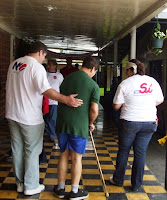 Former president and movie star Joseph Estrada (Erap) of the Philippines is a freed man.
Former president and movie star Joseph Estrada (Erap) of the Philippines is a freed man. He was sitting in front row during the swearing-in of President Noynoy Aquino. Erap had run in the last election in which Aquino won. He was the last to concede defeat and the closest rival of the President in the last election.
He was sitting in front row during the swearing-in of President Noynoy Aquino. Erap had run in the last election in which Aquino won. He was the last to concede defeat and the closest rival of the President in the last election.As the first former president in Southeast Asia to be convicted of corruption (two counts of plunder) on September 12, 2007 and sentenced for 40 years of imprisonment, Estrada was granted pardon by President Gloria Macapagal-Arroyo (GMA) on October 25, just 43 days after the conviction. And now he sits with the President that vows to fight corruption.
The explanations given for the pardon were that Estrada was already 70 years old, had been in house arrest for six and a half years, and had committed not to seek any elective positions in the country. The last one is brazenly a mockery of the intent of GMA's controversial pardon.
Justifying the pardon, GMA in a speech before the Philippine Business Conference said that "national unity, rule of law, justice with accountability" were the reasons behind the pardon. Again, the last reason is a disgrace to "justice with accountability."
Various sectors and personalities were divided on the issue of pardon to Estrada. Asserting that justice and fairness should prevail, the influential Catholic Bishops Conference of the Philippines (CBCP) expressed opposition to the pardon while few bishops backed pardoning the ex-president. Former president Fidel Ramos (1992-1998) warned the Arroyo government that the pardon could be the start of its downfall while former president Corazon Aquino (1986-1992) who came to power through the first people power revolution welcomed the pardon for the deposed president. The loudest opposition to pardon came from the civil society and left-leaning groups that toppled Estrada from power while the most vocal supporters of the pardon were allies of the former president.
Estrada was ousted from power in 2001 by the second people power revolution over corruption and lavish lifestyle scandals. Noynoy's mother, Cory Aquino, was at the forefront of both people power 1 and 2 revolutions. In the second one, GMA who was then the Vice-President assumed the presidency and was declared winner in the controversial 2004 presidential election despite evidences of widespread cheating and electoral fraud.
As predecessor of Estrada, GMA is also facing and hounded by various corruption charges and scandals in the impeachment cases filed against her since 2005, 2006, and 2007. Critics of the Arroyo administration interpreted the pardon to ex-president Estrada as precedent to GMA if she is found guilty of the charges after her term of office. Her incumbency as President provides her immunity and shields her from being charged in a trial court.
Now President Aquino is forming a commission to formally investigate GMA for her various "lapses" in judgment. This time, "I'm sorry" is not sufficient to get her away from her culpability and accountability of her alleged sins to the Filipinos and Filipinas.
Meanwhile, Erap was greeted by some of his supporters and fans during the inauguration of President Aquino. As a popular movie star, he draws his main following from the masses. Just like in the movies he usually portrayed, he was in the limelight. The typical endings of his movies thread on the redemption of the protagonist.
Will it be the same in real life? Noynoy can change the script.













